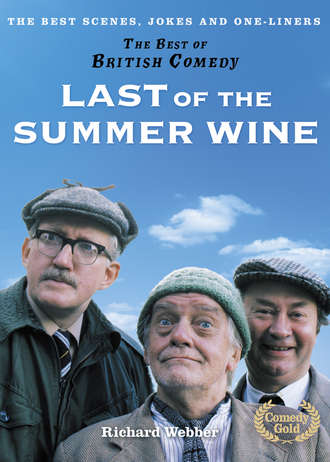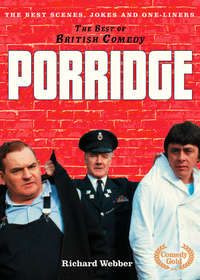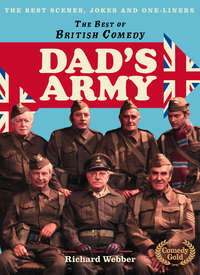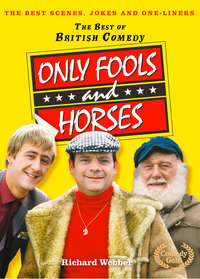
Полная версия
Last of the Summer Wine

Last of The Summer Wine
The Best of British Comedy
The Best Scenes, Jokes and One-liners
Richard Webber

Table of Contents
Cover Page
Title Page
INTRODUCTION
THE STORY IN A NUTSHELL
HAIL SMILING MORN OR THEREABOUTS
THE GREAT BOARDING-HOUSE BATHROOM CAPER
CHEERING UP GORDON
FLOWER POWER CUT
WHOOPS
IN THE SERVICE OF HUMANITY
CAR AND GARTER
THE ODD DOG MEN
A BICYCLE MADE FOR THREE
ONE OF THE LAST FEW PLACES UNEXPLORED BY MAN
SERENADE FOR TIGHT JEANS AND METAL DETECTOR
FROM WELLIES TO WET SUIT
ALL MOD CONNED
THE WHITE MANS GRAVE
GETTING SAM HOME
THE LOXLEY LOZENGE
THE MYSTERIOUS FEET OF NORA BATTY
KEEPING BRITAIN TIDY
ENTER THE PHANTOM
CATCHING DIGBY’S DONKEY
UNCLE OF THE BRIDE
THE HEAVILY REINFORCED BOTTOM
DRIED DATES AND CODFANGLERS
THE REALLY MASCULINE PURSE
WHOS FEELING EJECTED, THEN?
EDIE AND THE AUTOMOBILE
MERRY CHRISTMAS, FATHER CHRISTMAS
DANCING FEET
THAT CERTAIN SMILE
DOWNHILL RACER
THE DAY OF THE WELSH FERRET
CRUMS
RETURN OF THE WARRIOR
THE EMPIRE THAT FOGGY NEARLY BUILT
THE LAST SURVIVING MAURICE CHEVALIER IMPRESSION
WAS THAT NORA BATTY SINGING?
THE PHANTOM OF THE GRAVEYARD
HAVE YOU GOT A LIGHT MATE?
STOP THAT BATH
THE GLORY HOLE
ADOPTED BY A STRAY
THE DEFEAT OF THE STONEWORM
BICYCLE BONANZA
HOW TO CREATE A MONSTER
DESTINY AND SIX BANANAS
BEWARE OF THE OGLETHORPE
BEWARE THE VANILLA SLICE
ELEGY FOR FALLEN WELLIES
SURPRISE AT THROSTLENEST
JUST A SMALL FUNERAL
THE MIRACULOUS CURING OF OLD GOFF HELLIWELL
THE CROWCROFT CHALLENGE
I WAS A HITMAN FOR PRIMROSE DAIRIES
TEST YOUR KNOWLEDGE
ACKNOWLEDGEMENTS
Other Books By
Copyright
About the Publisher
INTRODUCTION
Think for a moment about all those classic sitcoms. While the premise, period, setting and style may differ, there are ingredients which are inherent in all of the examples, factors which must be in place if the programme is to rise above the norm and reach the higher echelons of the genre. Without these, the comedy—albeit watchable and likely to occasion a chuckle every now and again—will be just another run-of-the-mill product. Of course, in today’s ruthless world of TV, such offerings wouldn’t get a second glance, let alone a commission.
So what are some of these magical elements which are intrinsically entwined in the fabric of the best sitcoms? If we knew the answer to that we’d been overflowing with scriptwriting millionaires and not have one small-screen turkey to ridicule. But it’s clear when you consider the likes of Dad’s Army, Porridge, Only Fools and Horses, Steptoe and Son, The Good Life, Fawlty Towers et al that there are similarities—and you certainly don’t need to be Einstein to spot them, either. All possess a sterling cast, for starters; performers who are adept in their craft and can bring a script to life with a single glance, a strained twitch, a puff of the cheeks.
Then there is the script itself. A proficient cast needs decent material to work with, and it’s all too easy to forget the person behind the scenes, the creator whose job is to create, time after time, a high calibre script. In such a competitive arena one can only admire the ability of writers to produce an inordinate amount of crisp, rich and humorous material.
No finer example of the aforementioned qualities can be found than in Yorkshire-born Roy Clarke’s scripts. A purveyor of fine dialogue and characterisation, this former teacher and policeman has afforded us the likes of Open All Hours, Keeping Up Appearances and, of course, the delectable Last of the Summer Wine.
If you ever wanted a seamless example of quality writing, acting and production then look no further than Summer Wine, the world’s longest-running TV sitcom. For proof of its popularity and class, just consider how long it’s been entertaining audiences: 36 years. On the surface, the show appears simply to spotlight the daily lives of, primarily, three old men ambling through their autumn years. But, as expected, there is much more to the programme, including a recurring sense of sadness, a feeling of missed opportunities and contemplating the real meaning of life, beautifully expressed through the reflective nature of the leading characters.
DID YOU KNOW?
One of Summer Wine’s claims to fame is that it was the first British TV comedy recorded in stereo sound.
We’ll be sampling this and much more within these covers. If you want to find out how the series was conceived, discover some interesting facts about the show, learn about the writer’s, performers’ and producer’s experiences, as well as enjoying some of the finest scenes in the long-running sitcom, which extends to over 280 episodes, then settle back and keep reading!
RICHARD WEBBER
THE STORY IN A NUTSHELL
It was the 4 January 1973 and a half-hour comedy pilot, ‘Of Funerals And Fish’, had just flickered on to our screens. Nora Batty was chatting with a neighbour when a small van pulled up outside. A man jumped out and disappeared into Bill ‘Compo’ Simonite’s house next-door.
NORA: They’re taking his telly again.
NEIGHBOUR: God, is it Tuesday already?
These lines provided the first breath in the life of a programme which would become a small-screen legend; it’s the doyen of all sitcoms and still going strong, 36 years later. It’s hard to find another sitcom which evokes so many emotions than Roy Clarke’s Last of the Summer Wine. A sense of innocence, humour, contemplation, sadness—they’re all there, embedded in scripts brought to life by a fine bunch of actors, and I’m not just referring to the main cast: even those recruited to play secondary characters or guests roles turned out well-honed performances.
But where Summer Wine scored extra marks is in its delicious setting. Yes, the Pennines, in the heart of Yorkshire, can be rugged, bleak and, as the performers often discovered, exceedingly chilly. But the greenery and fine curves of the rolling landscape provided a wonderful backdrop to the show.
To unearth the origins of the sitcom, we have to travel back nearly four decades to that Comedy Playhouse offering in the depths of winter 1973. Pioneering Duncan Wood, the then Head of Comedy at the BBC, who’d produced such shows as Hancock’s Half-Hour and The World of Beachcomber, had seen Roy Clarke’s comedy drama The Misfit, which between 1970 and 1971 ran to two series on ATV; he regarded the writer as the right man to pen a pilot script he had in mind, even though Roy had established himself, primarily, as a writer of drama.
The premise for the half-hour script centred around the daily goings-on in the lives of three elderly men—not that much happened; for them, it was about trying to fill their very long days with something to occupy their ageing minds, although they fought tooth-and-nail against the onset of old age. For a while, Roy Clarke struggled with the concept and was on the verge of declining the chance to write the pilot script; but then he found a solution to his predicament: by treating the three central characters like juveniles, with carefree attitudes and a sense of freedom akin to the years of adolescence, he created plenty of opportunities to inject humour into the script.
Everything clicked. Roy Clarke delivered a script which was shown as a pilot programme, a well-proven way of discovering which comedy ideas had the legs to become a full-blown series. The pilot, ‘Of Funerals And Fish’, was transmitted on that January evening and before long a series was commissioned. The first of six episodes, ‘Short Back And Palais Glide’, was screened in November 1973.
‘WE’VE REALLY CRACKED IT THIS TIME.’ (HOWARD)
For a time, it looked as if the series would be called The Library Mob, despite Roy’s provisional title being Last of the Summer Wine. Thankfully, BBC executives saw sense and opted for the writer’s suggestion, which in its way symbolised the sitcom’s style and format. Here, three men were reaching the twilight of their lives, despite what they may have wanted to believe, so savouring the final drops of life to the full, like you would a fine wine, were of paramount importance.
Roy Clarke’s title conjures up images of rurality, too, and this aspect of the programme was an integral part of its success and longevity. For me, like millions of other fans, the characters’ regular wandering on the hills, far beyond the clatter and noise of civilisation, was a crucial element—a form of escapism. It’s a well-known fact that much of the filming takes place in and around Holmfirth, a small West Yorkshire town situated in the Holme Valley. Six miles south of Huddersfield, the town grew up around a corn mill and bridge in the thirteenth century, and has now been placed firmly on the tourist map, thanks to Summer Wine. The location was suggested by the late Barry Took, who’d filmed a half-hour instalment of a BBC documentary series close to the town; aware that Duncan Wood was shooting a Yorkshire-based comedy pilot, he recommended they take a look at Holmfirth.
The central trio of characters, beginning with Bill ‘Compo’ Simonite, Norman Clegg and Cyril Blamire, were written as old
DID YOU KNOW?
Peter Sallis, who’ll forever be linked with the wonderful Norman Clegg, found himself cast as his own father in Roy Clarke’s First of the Summer Wine.
friends, creating an instant bond between them and affording Roy the chance to exploit their long-held friendships for comedy purposes.
When casting the lead roles, one actor was top of the list to fill the shoes of Norman Clegg. Peter Sallis had already appeared in Roy Clarke-scripted programmes and the writer knew that upon creating Clegg, a retired lino salesman, Sallis was the man for the job. The other lead roles went to experienced thespian Michael Bates (Cyril), who’d appeared in myriad TV and big-screen roles, and equally experienced cockney actor Bill Owen (Bill).
However, the casting of Owen, whose long list of credits included the first two Carry On films, Sergeant and Nurse, worried Roy Clarke, who regarded Compo as the archetypal layabout. He’d only seen Owen playing roles as straight cockney, whereas Jimmy Gilbert, who produced the first series, had seen him in plenty of northern parts on stage. Roy’s doubts were soon dispelled, though, when he observed Owen at the opening read-through. Now, of course, it’s hard to imagine anyone other than Bill Owen playing Compo, the kind-hearted, welly-wearing scruff bag.
The personnel may have changed over the years, but Summer Wine’s adaptability has seen it remain largely unaffected by any upheavals. Just like the Carry On films, where producer Peter Rogers intentionally avoided hiring star names, Summer Wine benefits from the same approach. Other sitcoms may have struggled if one of its leading names had departed: think of Porridge without Barker, Fawlty Towers without Cleese—well, you can’t, can you? Employing well-proven and reliable character actors in the roles, intentionally or not, has enabled the programme to grow with age and cope with the changes in faces that one would expect in a programme lasting nearly four decades.
One such change was the departure of Michael Bates. When he left in 1975, he was replaced by Brian Wilde, alias Barrowclough in Porridge, who played Foggy Dewhurst for nine years—although he came back for a seven-year stint in the
1990s—before Michael Aldridge, as Seymour Utterthwaite, arrived for four years to make up the male trio. Then, after Wilde’s second spell ended, veteran actor Frank Thornton, who’d delighted sitcom audiences with his sniffy portrayal of Captain Peacock in Are You Being Served?, was a last-minute replacement as Herbert Truelove.
Throughout the years, the programme has enjoyed a plethora of supporting characters. Three of the most memorable were present in the opening instalments: Nora Batty, Ivy and Sid, played by Kathy Staff, Jane Freeman and John Comer respectively. Other regulars have arrived over the years, such as Edie (Dame Thora Hird), Pearl (Juliette Kaplan), Auntie Wainwright (Jean Alexander), Glenda (Sarah Thomas), Marina (Jean Fergusson), Wally (Joe Gladwin), Wesley (Gordon Wharmby), Howard (Robert Fyfe), Barry (Mike Grady), Smiler (Stephen Lewis), Tom (Tom Owen), Alvin (Brian Murphy) and Entwistle (Burt Kwouk). All have done a sterling job under the direction of, among others, Jimmy Gilbert, Sydney Lotterby and, of course, Alan J W Bell, who has produced and directed the series for 27 years.
The series has now reached its 30th season, with Russ Abbot joining the cast as Hobbo. There is uncertainty surrounding its long-term future but regardless of how long it continues, Summer Wine will remain a classic sitcom and, hopefully, enjoyed by generations to come.
‘HAIL SMILING MORN OR THEREABOUTS’
Blamire and Compo go into the library to look at a photo exhibition. Compo takes out one of his doorstep-sized sandwiches.
BLAMIRE: You know, if ever one of those came up in the middle of the North Sea, there’d be an international incident to decide who was entitled to stick a flag into it.
COMPO: Come on, let’s go call on Clegg.
BLAMIRE: Just a moment. Just a moment. I’m studying contrast and tone. I used to exhibit myself, you know.
COMPO: You mucky old devil.
BLAMIRE: In the 14th Field Signals Regimental Camera Club, I won the Mrs. Colonel Langford O.B.E. Award for my interpretation of a soldier’s farewell at F11 in 1/60th of a second. Of course, the equipment has improved since those days.
COMPO: (Sadly) Mine hasn’t.
BLAMIRE: It’s marvellous what you can do with a close-up lens.
COMPO: Well, hurry up and do it and let’s go and get Clegg.
BLAMIRE: You’ve no cultural interests at all, have you?
COMPO: I’ve got me ferrets.
BLAMIRE: Didn’t you take any advantage of the army’s further education schemes?
COMPO: Well, we had this army film show once about social diseases. My mate fainted. (He approaches the display) Well it’s all a lot of rhubarb this, innit? Look at this—a tatty bit of wood. Who wants to take a photograph of a photograph of a lump of wood?
BLAMIRE: It’s a study in texture.
COMPO: I bet that bloke had a dolly bird sitting on there.
BLAMIRE: So what?
COMPO: And he clicked his shutter and she fell off. (He has a good chuckle)
BLAMIRE: You’ve no idea, no idea at all.
COMPO: Hey up! (looking very closely at a picture) Hey, look at this ’ere “September Morn”.
MEMORIES…
‘Duncan Wood recognised the comic element in my ITV series, The Misfit, and wanted me to try a sitcom. What threw me, though, was he required something for three old men—a dreadful idea, I thought. It left me cold and after playing about with it intensively for a couple of weeks, I couldn’t make it work. It bored me. Then, out of desperation, I thought that if they were all footloose and free, they were in the same position as adolescents at the other end of the scale. The minute I saw them as kids, it worked.’
ROY CLARKE
’Working with John Comer [Sid] was a joy. He was a stand-up comedian and wonderful at delivering the lines. He was very popular.
JANE FREEMAN (Ivy)
‘THE GREAT BOARDING-HOUSE BATHROOM CAPER’
Foggy and Clegg are sat in the café. Ivy, in hat and coat, is at another table, gripping her handbag and looking stern. They’re waiting for Compo to arrive, also Gordon with his minibus.
IVY: Are you sure you locked the back door?
SID: Thirty-three times you sent me to lock that back door. I’ve been up since six o’clock just locking the back blasted door.
IVY: Yes. Leave me to do all the packing.
SID: Packing? It’s more like unpacking. ‘You can’t take them,’ she keeps saying. ‘I’ve no room for them. I haven’t an inch of space’. Then she opens her mouth.
IVY: I heard that.
SID: And I’ve been hearing that (indicating her mouth) for nearly 30 years. Have a rest woman, you’re on holiday.
MEMORIES…
‘Jimmy Gilbert offered me Ivy after seeing me play a dreadful landlady in The Fishing Party. I’ll never forget recording the pilot because immediately afterwards I went on my delayed honeymoon to Greece. We had to catch a 10pm flight and with little time to prepare I went off resembling Ivy, with my normally curly hair greased down flat!
‘I used to get aggressive people come up to me in the street, complaining about how I mistreated Sid; and people, usually men, would approach my poor husband, saying, “She must be hell to live with!” My late husband, director Michael Simpson, knowing the soppy me, got upset because he didn’t care to be regarded as a henpecked husband.
‘It’s been an honour saying some of Roy Clarke’s lines. In the early days, though, I thought the show was chauvinistic and questioned whether to carry on. But then Enid [Roy Clarke’s wife] said to me: “You’ve got to remember, Ivy is me, and she’s a powerful woman—she’s a compliment.” I didn’t mind so much after that.’
JANE FREEMAN (Ivy)
‘CHEERING UP GORDON’
Ivy and Sid are holidaying in Scarborough. They’re sat in deckchairs on the beach. Sid is dozing in his chair making light snoring noises. Ivy is deeply involved in a women’s romantic magazine. Sid snores and reality kicks in. She belts him with the magazine as she compares her husband to the hunk in her magazine.
SID: (Startled) What’s up?
IVY: Talk to me.
SID: What.
IVY: You never talk to me not even when we, well you know…(in a low voice) not even when we make love.
SID: There’s not much to talk about, the rate we go at it. You still do it as if your mother’s watching.
Конец ознакомительного фрагмента.
Текст предоставлен ООО «ЛитРес».
Прочитайте эту книгу целиком, купив полную легальную версию на ЛитРес.
Безопасно оплатить книгу можно банковской картой Visa, MasterCard, Maestro, со счета мобильного телефона, с платежного терминала, в салоне МТС или Связной, через PayPal, WebMoney, Яндекс.Деньги, QIWI Кошелек, бонусными картами или другим удобным Вам способом.






